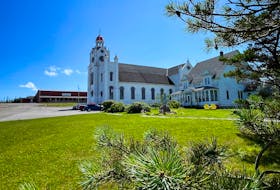It wasn’t without a few bumps along the way, but Canada’s biggest film this year will premiere at the Toronto International Film Festival next week — and it happens to be local.
“The Grand Seduction,” a co-production of St. John’s-based Morag Loves Company and Quebec’s Max Films, was filmed last summer in Trinity Bight, with a cast that includes Gordon Pinsent, Mark Critch, Mary Walsh, Cathy Jones and Pete Soucy, alongside Irish actor Brendan Gleeson (“Harry Potter,” “In Bruges”), Taylor Kitsch (“Friday Night Lights”) and Liane Balaban (“Last Chance Harvey,” “Above and Beyond”). The film is directed by Don McKellar, and it’s a remake of the 2013 Quebec film “La grand séduction, “ of which the English version, “Seducing Dr. Lewis” won the Audience Award at the Sundance Film Festival in 2004.
The original film is set in the tiny fishing village of Ste-Marie-la-Mauderne on the north coast of Quebec. A plastic container factory considers the possibility of setting up in the town — thereby saving it from economic misery — but only if there’s a resident doctor and a certain sized population; the villagers then attempt to seduce a doctor into moving there by making him believe it’s the finest place on Earth to call home.
A few changes to the script — Ste-Marie-la-Mauderne, Quebec became Tickle Head, N.L.; the plastic factory became an oil company wanting to set up a petroleum plant — and the plot is even more relevant to Newfoundlanders than perhaps it ever was to Quebecers.
Gleeson plays Murray French, a man born and raised in Tickle Head, forced to take control in the community when others fail. The town’s mayor up and leaves with his family in the middle of the night during negotiations with the oil company, seeing no future for the place, and Murray co-ordinates the effort to get a doctor into the community.
When Dr. Paul Lewis, played by Kitsch, arrives, the entire town takes action, painting old buildings (or at the very least, branding the most unfixable structures as heritage sites), learning cricket (the doctor’s favourite sport) and attempting to set him up with a love interest.
Critch plays Henry Tilley, Tickle Head’s banker.
“Henry is the fellow who has got pretty much the only job in the town,” he explained. “He’s the manager of the bank and basically all he does is cashes welfare cheques. He takes himself very seriously. He’s a little bit prissy, a little uptight, and he would have probably been, growing up, the fellow that people shoved around and whatnot.
“Once the big plan hatches to get the doctor to stay there, he’s got to get in on it. There are going to be bank documents that need to be forged, they’re going to need a nice place for him to stay and they need somebody who can talk to a doctor. I get to be included in this, even though it will probably cost me my job if it goes wrong, but there’s something nice about being part of a gang.”
“The Grand Seduction” was originally set to be filmed in 2011 with a different director, who was let go when it became clear he and producers Barbara Doran and Roger Frappier didn’t share a common vision for the film. Ken Scott, writer of the original version of the movie, was brought in to direct.
“With the first director we had done location scouting, initial casting meetings, we had reworked the script, discussed crew,” Doran said. “We had to go through that whole process once again.”
Six months into that process, Scott suddenly announced he was leaving the project, having been contacted by Steven Spielberg to direct the Hollywood remake of “Starbuck,” Scott’s 2010 Quebec film.
Producers made no secret of their disappointment.
“That was a crushing blow, because he actually did get it; he was going to make the same film we wanted to make,” Doran said. “But this business is not without its twists and turns and sinkholes and pitfalls. You brush yourself off and keep going. We thought, ‘OK, who is out there on the Canadian scene that is a very good director,’ and Don McKellar’s name popped up.”
McKellar is a Tony Award-winning writer and director, known for the book for the musical “The Drowsy Chaperone,” “Childstar” (in which he starred as well as wrote and directed), and CBC TV’s “Michael: Tuesdays and Thursdays,” which had just been axed by the network at the time Scott left.
McKellar “got” the film, too, Doran said.
“You know it when people put their feet on the ground here, you know it the first time they go to outport Newfoundland, you know it by the way they talk to people, you know it the way they talk to their crew and interact with producers,” she explained. “We’re very, very happy.”
When it came to casting, Doran, who has a personal mandate to favour local talent, showed McKellar and Frappier copies of “CODCO,” “This Hour Has 22 Minutes,” “Young Triffie” and others, and Critch, Walsh, Jones and Soucy were quickly brought on board.
Anyone of Gleeson’s calibre, Doran said, does not audition. The script was sent to his agent, and months later, he gave the green light. Getting the Irishman to learn a Newfoundland accent came down to a dialect coach, brought in from Toronto, as well as Critch, who became his pal on set.
“He was worried about the accent,” Critch said of Gleeson. “Brendan had me record all of his lines before I met him. I recorded his whole script for him, and I would help him out a lot. What I said to him was, ‘Look, there is no accent. There are 1,000 accents. If I were you, I’d pretty much just talk like yourself.’ He said, ‘No, I want to try and match you and Gordon.’ He worked really hard on it and he did as well as anybody.”
The film, with a vibe and storyline reminiscent of “Waking Ned Devine,” will premiere with a gala screening at the Toronton International Film Festival in Toronto’s Roy Thompson Hall Sept. 8.
After that, it’s on to the Atlantic Film Festival before opening the Calgary Film Festival and, in October, will open the St. John’s Women’s International Film Festival.
Joe’s Place, a bar and restaurant in Trinity Bight built especially for the film, is still functioning and officially opened to the public last month. It’s the second part of a film set handed over to the area: the site built for Doran’s CBC mini-series “Random Passage,” filmed in 2003, is still a tourist attraction. More than $60 million has been spent in the Trinity Bight area to date on large film productions: along with “The Grand Seduction” and “Random Passage,” “The Shipping News,” starring Kevin Spacey, was filmed there in 2001, and Walsh’s “Young Triffie” in 2005. Distribution rights to “The Grand Seduction” have already been sold in 21 countries, and a theatrical release across the country is planned for this fall.
Twitter: @tara_bradbury
It wasn’t without a few bumps along the way, but Canada’s biggest film this year will premiere at the Toronto International Film Festival next week — and it happens to be local.
“The Grand Seduction,” a co-production of St. John’s-based Morag Loves Company and Quebec’s Max Films, was filmed last summer in Trinity Bight, with a cast that includes Gordon Pinsent, Mark Critch, Mary Walsh, Cathy Jones and Pete Soucy, alongside Irish actor Brendan Gleeson (“Harry Potter,” “In Bruges”), Taylor Kitsch (“Friday Night Lights”) and Liane Balaban (“Last Chance Harvey,” “Above and Beyond”). The film is directed by Don McKellar, and it’s a remake of the 2013 Quebec film “La grand séduction, “ of which the English version, “Seducing Dr. Lewis” won the Audience Award at the Sundance Film Festival in 2004.
The original film is set in the tiny fishing village of Ste-Marie-la-Mauderne on the north coast of Quebec. A plastic container factory considers the possibility of setting up in the town — thereby saving it from economic misery — but only if there’s a resident doctor and a certain sized population; the villagers then attempt to seduce a doctor into moving there by making him believe it’s the finest place on Earth to call home.
A few changes to the script — Ste-Marie-la-Mauderne, Quebec became Tickle Head, N.L.; the plastic factory became an oil company wanting to set up a petroleum plant — and the plot is even more relevant to Newfoundlanders than perhaps it ever was to Quebecers.
Gleeson plays Murray French, a man born and raised in Tickle Head, forced to take control in the community when others fail. The town’s mayor up and leaves with his family in the middle of the night during negotiations with the oil company, seeing no future for the place, and Murray co-ordinates the effort to get a doctor into the community.
When Dr. Paul Lewis, played by Kitsch, arrives, the entire town takes action, painting old buildings (or at the very least, branding the most unfixable structures as heritage sites), learning cricket (the doctor’s favourite sport) and attempting to set him up with a love interest.
Critch plays Henry Tilley, Tickle Head’s banker.
“Henry is the fellow who has got pretty much the only job in the town,” he explained. “He’s the manager of the bank and basically all he does is cashes welfare cheques. He takes himself very seriously. He’s a little bit prissy, a little uptight, and he would have probably been, growing up, the fellow that people shoved around and whatnot.
“Once the big plan hatches to get the doctor to stay there, he’s got to get in on it. There are going to be bank documents that need to be forged, they’re going to need a nice place for him to stay and they need somebody who can talk to a doctor. I get to be included in this, even though it will probably cost me my job if it goes wrong, but there’s something nice about being part of a gang.”
“The Grand Seduction” was originally set to be filmed in 2011 with a different director, who was let go when it became clear he and producers Barbara Doran and Roger Frappier didn’t share a common vision for the film. Ken Scott, writer of the original version of the movie, was brought in to direct.
“With the first director we had done location scouting, initial casting meetings, we had reworked the script, discussed crew,” Doran said. “We had to go through that whole process once again.”
Six months into that process, Scott suddenly announced he was leaving the project, having been contacted by Steven Spielberg to direct the Hollywood remake of “Starbuck,” Scott’s 2010 Quebec film.
Producers made no secret of their disappointment.
“That was a crushing blow, because he actually did get it; he was going to make the same film we wanted to make,” Doran said. “But this business is not without its twists and turns and sinkholes and pitfalls. You brush yourself off and keep going. We thought, ‘OK, who is out there on the Canadian scene that is a very good director,’ and Don McKellar’s name popped up.”
McKellar is a Tony Award-winning writer and director, known for the book for the musical “The Drowsy Chaperone,” “Childstar” (in which he starred as well as wrote and directed), and CBC TV’s “Michael: Tuesdays and Thursdays,” which had just been axed by the network at the time Scott left.
McKellar “got” the film, too, Doran said.
“You know it when people put their feet on the ground here, you know it the first time they go to outport Newfoundland, you know it by the way they talk to people, you know it the way they talk to their crew and interact with producers,” she explained. “We’re very, very happy.”
When it came to casting, Doran, who has a personal mandate to favour local talent, showed McKellar and Frappier copies of “CODCO,” “This Hour Has 22 Minutes,” “Young Triffie” and others, and Critch, Walsh, Jones and Soucy were quickly brought on board.
Anyone of Gleeson’s calibre, Doran said, does not audition. The script was sent to his agent, and months later, he gave the green light. Getting the Irishman to learn a Newfoundland accent came down to a dialect coach, brought in from Toronto, as well as Critch, who became his pal on set.
“He was worried about the accent,” Critch said of Gleeson. “Brendan had me record all of his lines before I met him. I recorded his whole script for him, and I would help him out a lot. What I said to him was, ‘Look, there is no accent. There are 1,000 accents. If I were you, I’d pretty much just talk like yourself.’ He said, ‘No, I want to try and match you and Gordon.’ He worked really hard on it and he did as well as anybody.”
The film, with a vibe and storyline reminiscent of “Waking Ned Devine,” will premiere with a gala screening at the Toronton International Film Festival in Toronto’s Roy Thompson Hall Sept. 8.
After that, it’s on to the Atlantic Film Festival before opening the Calgary Film Festival and, in October, will open the St. John’s Women’s International Film Festival.
Joe’s Place, a bar and restaurant in Trinity Bight built especially for the film, is still functioning and officially opened to the public last month. It’s the second part of a film set handed over to the area: the site built for Doran’s CBC mini-series “Random Passage,” filmed in 2003, is still a tourist attraction. More than $60 million has been spent in the Trinity Bight area to date on large film productions: along with “The Grand Seduction” and “Random Passage,” “The Shipping News,” starring Kevin Spacey, was filmed there in 2001, and Walsh’s “Young Triffie” in 2005. Distribution rights to “The Grand Seduction” have already been sold in 21 countries, and a theatrical release across the country is planned for this fall.
Twitter: @tara_bradbury








